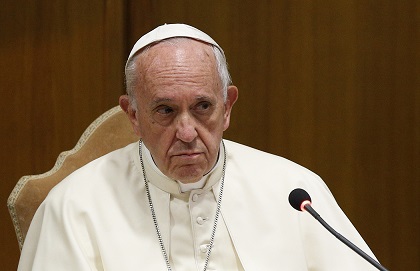“Francis has changed much in the workings of the Holy See, and the traditional bishops’ visits are not immune from this”, writes Michael Kelly
At the Vatican press office on Friday morning, dozens of journalists waited patiently for the script of what Pope Francis would say to the Irish bishops present for their ad limina visit. It wasn’t so much that the journalists were particularly interested in the Irish situation (many were). But, it was more the fact that Pope Francis had not received a delegation of bishops on an ad limina visit in well over a year. Such trips had been suspended during the jubilee ‘Year of Mercy’ to free up the Pontiff.
Francis has changed much in the workings of the Holy See, and the traditional bishops’ visits are not immune from this.
In recent decades, Popes have tended to read speeches to the bishops on an ad limina trip. This allowed journalists to parse the text and tease out what the Vatican interpreted as priorities for a particular country or group of bishops.
Speculation
Early on Friday morning I had asked Paloma García Ovejero, deputy director of the Vatican Press Office, when I could expect a copy of the text. The press office had not, as yet, received such a text. She speculated that she thought the Pope would speak off-the-cuff. It was unclear, she said, since it has been a while since he’d hosted ad limina visits.
Sure enough, there was no papal text. At the press conference afterwards, Archbishop of Armagh Eamon Martin summed up the mood.
“He [the Pope] said at the beginning, ‘I’ll throw in the ball and let’s see what happens’, so it turned out to be a conversation about the Church in Ireland, about the struggles and challenges we’re having, but also about the importance of a ministry of presence, a ministry of the ear, where we’re listening to the hopes, struggles and fears of our people.”
In his meeting with the Irish bishops, the Pope seemed to be ushering in a new style for the ad limina visits, one that would be more based on dialogue. There’s also the fact that the previous space for dialogue is probably lacking in the new ad limina arrangements since Pope Francis no longer meets privately with individual bishops, preferring the group setting.
Challenges
During their meetings the bishops said they spoke frankly of problems and challenges facing the Church in Ireland. Archbishop of Dublin Diarumuid Martin said that “no subject was off the agenda.
“Pope Francis again said to talk about our experiences, our challenges, our criticisms…One theme that came up on numerous occasions was the position of women in the Church, we brought it up in almost every congregation we went to and there was a willingness to listen and a recognition that we were asking a valid question, because the Irish episcopal conference is quite concerned about that theme,” Archbishop Martin said.
Vatican’s golden arches
Roman newspapers have been full of conversation in recent weeks about the new branch of fast-food giant McDonald’s that has opened right beside the Vatican.
Now it has emerged that McDonald’s is working with charity Medicina Sociale to provide free meals for Rome’s homeless community.
Volunteers will distribute meals made up of a double cheeseburger, an apple and a bottle of water to homeless people in and around the Vatican, every Monday lunchtime.
They expect to serve the free meal to up to 1,000 homeless people every Monday.
Pope’s informality sets an example
Pope Francis has become famous for his informality and the way in which he shuns long-established protocol if he feels it unnecessary.
A few bishops told me about a slightly unnerving moment during the audience with the Pope when, as one of the bishops was speaking, the Pope got up from his chair and darted across the room. More than a few bishops assumed he was leaving the room to use the bathroom. But, just as he was passing a few of the bishops he said gently that the interpreter, who had been translating between Italian and English and vice versa, needed some water. The Pope proceeded to a press which he promptly opened and took out a bottle of water, poured a glass and brought it back to the interpreter to slake his thirst.
It’s a powerful example of service and one, I suspect, we’ll hear from bishops in Holy Thursday homilies for quite some time to come!


 Michael Kelly
Michael Kelly